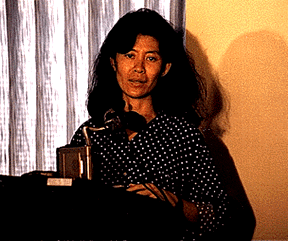Chee Yoke Ling
Third World Network
 I want to make two brief comments. I was concerned when Professor Falk mentioned the possibility of a more autonomous Security Council. Given his analysis of the geopolitical nature of the institution, I really don't see how this can be possible at this time. A comment also on the role of the International Court of Justice: the membership of the Court reflects Security Council geopolitics. To what extent one can involve the International Court of Justice and make it more effective is a question which is part of the whole process of making the UN system more democratic.
I want to make two brief comments. I was concerned when Professor Falk mentioned the possibility of a more autonomous Security Council. Given his analysis of the geopolitical nature of the institution, I really don't see how this can be possible at this time. A comment also on the role of the International Court of Justice: the membership of the Court reflects Security Council geopolitics. To what extent one can involve the International Court of Justice and make it more effective is a question which is part of the whole process of making the UN system more democratic.
Today there is an economic crisis, there is a social crisis, and these are all escalating into political instability in each of our countries and across borders. Many NGOs and citizens groups are getting into the UN system. They are learning and becoming more experienced. They see the pillar of power, where the decisions are taking place. We want to do a lot more. I think the challenge is how do we act in all the different arenas.
Looking at campaigning for Security Council reform, better control over trade, protecting the environment, children's rights, or whatever, we have to be very clear in our mind. How do we do it best? And how do we we begin to arrive at some comprehensive understanding of the interrelations between all the different developments from political to economic to environmental and social and all the institutions in which these decisions are made.
We can no longer leave everything to governments. On this, no one disagrees. And one can see the frustration of governments and the powerlessness of governments, because the actors are not just the citizens and the governments. There are also actors which no one talks about--the corporate sector.
The corporate sector today is very powerful in economic terms, in terms of decision-making influence, in terms of policy formula- tion. In the 1970's and '80's it was seen as a player that had to be controlled. But the balance between public and private interests has shifted very rapidly in the post-Cold War period. There is talk about "liberalization" and "partnership in sustain- able development" where interests that conflict with the corporate sector are very much neutralized.
Many of us have felt this within the UN system in the last two years. Examples include the dismantling of the UN Centre on Transnational Corporations as well as the weakening of ECOSOC and the social and economic sectors of the UN. The weakening of the General Assembly, ECOSOC and institutions such as UNEP seems to give a picture of the UN in which the Security Council is playing the critical role, while other organs are reduced to very small departments.
The forum where we can bring together peoples in a much more open discussion is being eroded. While we are talking about more accountability of the Security Council to the General Assembly, we must also struggle to strengthen the General Assembly and the other parts of the UN, where citizens can play a bigger role. Because we can talk about reform of the Security Council, but meanwhile the other parts of the UN are being chipped away. There will be nothing more to be accountable to.
At the end of the Uruguay Round, the Director General of GATT said that now that we have tied up up a trade package, we can have a three-sided pyramid of the two Bretton Woods Institutions and the GATT. The UN does not figure in those plans at all.
We do not want to see the Security Council moving to more selective enforcement, where the object would be only to protect one limited political or economic interest. We must fight to have checks and balances--of the same sort we like to see at the national level--at the international level as well.
Whatever we do with the Security Council, we need to be able to share the broader picture and make sure that we get institutions in all areas that can work for people.
I don't think we have any illusions about the UN. It is an irony that many of us--fighting at the national level against this project or that policy--always saw the UN as a problem. We saw it forcing us to take up policies of forestry, agriculture, health programs, and irrigation systems which didn't work. We, who were very critical of the UN, suddenly now find ourselves today having campaigns to save the United Nations. Why? Because, it is the only multilateral forum that we have. We must work to make it better. >From my experience, in my own country, I would not leave it up to the IMF nor to the World Bank, nor to those who call themselves free traders, to run the world. The UN must not be turned into another one of those institutions.
We need a new United Nations and we need it to work. If governments do not open the way for citizens, the UN should be their ally. If UN institutions do not address the needs of people, then nobody can save the United Nations.

